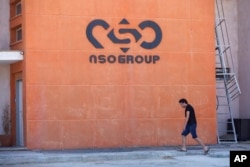A Spanish journalist whose cellphone was targeted by Pegasus spyware is fighting a civil lawsuit after Morocco demanded that he retract accusations that it spied on him.
The complaint against Ignacio Cembrero, an expert on Spanish-Moroccan relations and contributor to the Spanish news website El Confidencial, will be heard by a court in Madrid in December.
In 2021, an investigative journalism project found the Israeli-made spyware Pegasus installed on the devices of journalists, activists and opposition figures in dozens of countries, including several who either report on or live in Morocco.
The spyware, which the Israeli company NSO Group markets to government agencies, infiltrates mobile phones to extract data or to activate a camera or microphone to spy on their owners.
Cembrero had reported in El Confidencial about being targeted through Pegasus, apparently by Rabat.
The Moroccan government denied the allegations, saying there was no proof it is a client of NSO Group.
According to the legal complaint seen by VOA, Morocco is demanding that Cembrero withdraw his allegations and pay legal costs.
"Morocco is not involved in spying on Ignacio Cembrero nor on any other citizen" and "does not have the Pegasus program," Ernesto Díaz-Bastién, the lawyer representing the Moroccan government, told AFP.
When VOA approached Díaz-Bastién for a comment, a spokeswoman for the lawyer said he "did not comment on professional matters."
Cembrero sees the case as a political trial. The journalist is well known for his reports on King Mohammed VI and the Moroccan secret services, which have at times embarrassed Rabat.
"Morocco is taking me to court for accusing it of spying with Pegasus. The lawyers for Morocco know that they cannot take me to court for defaming a state as there is no such charge admissible under European law," he told VOA.
The journalist, who is based in Madrid, said, "This legal action is political, and they are trying to curtail journalists' freedom of expression. I will not back down."
The Moroccan Embassy in Madrid did not reply to telephone calls and emails from VOA asking for comment.
Alfonso Bauluz, president of Reporters Without Borders in Spain, said the lawsuit is an "attempt at intimidation."
"We hope that the courts follow the example of France and they throw out this case," Bauluz told VOA, referring to earlier failed efforts by Morocco over spyware claims. "It is not possible to defame a state under European law, only a person. It seems an abuse of law to try to attack this journalist."
The Pegasus investigation by the French media nonprofit Forbidden Stories and rights group Amnesty International found Pegasus had been used to infiltrate the telephones of several activists and journalists in Morocco, and that King Mohammed VI's phone details also appeared in records.
Rabat denied claims that it was involved and filed defamation cases in France against Amnesty and Forbidden Stories. But the claims were ruled inadmissible by French courts in March last year.
Forbidden Stories said that NSO Group did not answer its questions on those targeted, but that it said it "will continue to investigate all credible claims of misuse and take appropriate action based on the results of these investigations."
The U.S. Supreme Court on Monday rejected an appeal by NSO Group against a lawsuit that the WhatsApp messaging service filed against it, the Associated Press reported. NSO wanted to be recognized as a foreign government agent, which would entitle it to immunity under U.S. laws that limit lawsuits against foreign countries.
Freedoms curtailed
Morocco already has limited environment for media, rights experts say.
"Morocco controls critics well. Being a Spanish journalist in Morocco is very difficult," Bauluz said.
Some Spanish lawmakers and MEPs have questioned whether Morocco is using legal action against journalists to silence freedom of expression.
In a written question to the Spanish parliament, Jon Iñarritu, of the Basque separatist party Bildu, asked if Madrid "considered the Kingdom of Morocco was trying to curtail the freedom of expression of journalists through these court cases?"
The Spanish government said it supported free speech but as the case was going through the courts it could not comment on an individual case.
Maite Pagazaurtundúa, an MEP for the Renew Europe party, asked the European Commission whether Brussels would bring in measures to prevent strategic lawsuit against public participation (known as SLAPPs) being used by governments and companies to curb press freedom.
"Does the [Commission] intend to prioritize the adoption of the directive on strategic lawsuits (SLAPPs) against journalists and human rights defenders?" Pagazaurtundúa asked in a written question in December.
The European Commission has not replied.
Morocco's case against Cembrero is not a first for the journalist. In 2014, Morocco launched two legal cases against Cembrero for allegedly inciting terrorism in articles for the newspaper El Pais. Both criminal cases were dismissed by the Spanish courts.
A year later, Ahmed Charai, a Moroccan businessman, brought a case against Cembrero for civil defamation over an article published in El Mundo newspaper. Charai lost the case after a trial.
Spain's government had previously revealed in May 2022 that the mobile phones of Prime Minister Pedro Sanchez and several other key ministers were hacked using Pegasus software.
The government said it did not know what information was extracted or who was behind it, but authorities are convinced that it was an "external attack."
Foreign affairs analysts at the time noted that the hacking took place during a diplomatic row between Spain and Morocco in 2021, which was resolved only when Madrid supported Rabat's claim on the disputed territory of Western Sahara.
Some information in this report is from AFP.





